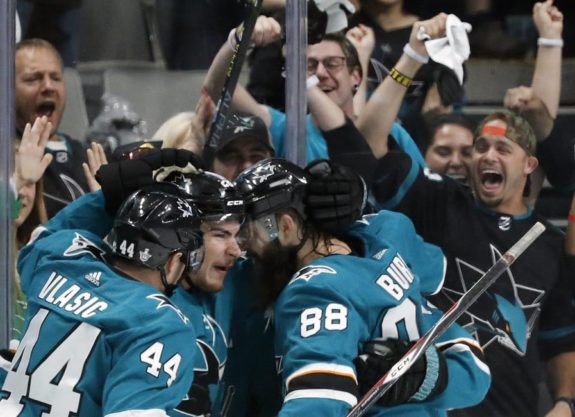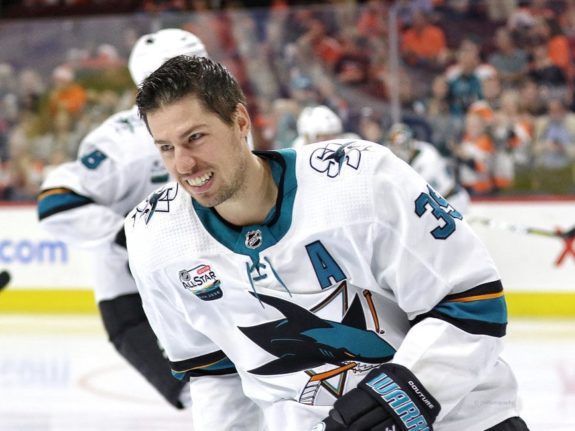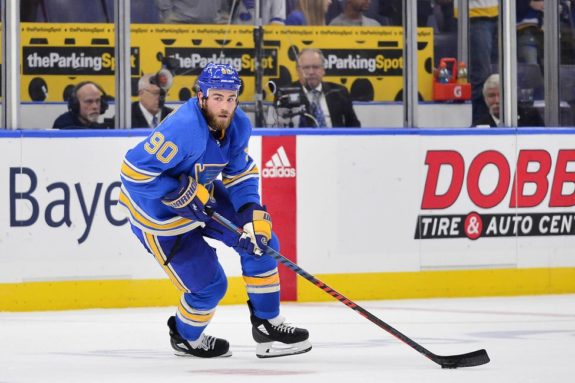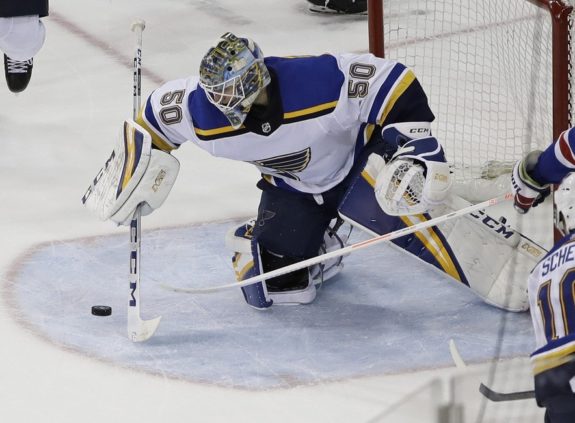The Stanley Cup playoff series between the San Jose Sharks and St. Louis Blues opened on Saturday night at the Shark Tank, with the home team posting a 6-3 win.
Game 1 is a single game in a best-of-seven series, and often the least important game in a series, at least as far as the final result goes. It is the game during which teams learn most about their opponents and how to match up effectively. After Game 1, adjustments begin and a series often takes on a very different tenor the rest of the way.
Sharks & Blues Game 1
In the game, the Sharks were the better team. The Blues, a bigger, heavier team, did some of the things they do well. They hit hard and often, especially Sharks defenseman Erik Karlsson. But their modus operandi, puck possession, was largely absent. The shifts where they were able to hold onto the puck for extended periods were few and far between.

The Blues were, all too often, a step slow, or, in the case of the Blues defenseman Jay Bouwmeester’s attempts to defend against Timo Meier in open ice, multiple steps slow.
In any series, a lot hinges on the officiating and what they’ll call and what they’ll ignore. In Game 1, the Blues used interference with frequency, the official calls were uneven. An early call against Bouwmeester led to a Sharks score, but a non-call in Period No. 2 led to a Blues goal.
Not only were the Sharks able to keep the Blues away from their puck possession game, they were also effective at creating turnovers. Turnovers led to most of the Sharks scores, with both Meier and Logan Couture netting two apiece. Kevin Labanc added another quick strike score, while Joe Pavelski scored the game’s lone power-play goal.

For the Blues, goals came from three different lines. Defenseman Joel Edmundson somehow wound up in front the Sharks net and a Jaden Schwartz shot deflected off of Edmundson past Sharks netminder Martin Jones for the Blues’ opening score. Vladimir Tarasenko was also credited with an assist on the play, his first assist of the playoffs and just his second even-strength point.
Ryan O’Reilly got his first goal in nine games (with help from the aforementioned interference non-call), using a slick move at the side of the net for his tally to pull the Blues within a goal at 3-2.

Their third tally came with seven minutes left in regulation and the Blues down 5-2. The Blues pressed effectively, with Patrick Maroon sending a feed to Tyler Bozak on the backside of the play. Bozak had plenty of net to shoot at and didn’t miss.
The Power Plays
Statistically, the Sharks power play delivered, converting on one of their three opportunities. The reality is less compelling. The Sharks lone tally came during a 5-on-3 power play. The initial call, an interference call, was soft by the standards which showed up later in the game. A slashing call less than a minute into the man advantage against Colton Parayko was an unnecessary, self-inflicted penalty. The Sharks power play with a man advantage was tepid, but with a two-man advantage, it delivered. Of course, 5-on-3 power plays are typically rare and neither team can count on them.

While the Sharks power play with just a one-man advantage was tepid, the Blues lone power play wasn’t any better. It might have been a tad worse.
A Sharks Window
Win or lose, Game 1 is hardly decisive. But building on a Game 1 win tips the odds in the series in a meaningful way. For the third time in the playoffs, the Sharks have won the opening game. In all three games, they won by a large margin. Twice, they were beaten in Game 2, indicating the opposition made needed adjustments.
It gets a little worse for the Sharks, They’re now up one game in a series for the fifth time this playoff season. In the four prior chances to go up two games, they’ve come up empty, losing all four games. In this postseason, the Sharks have yet to be notably better than their opponents in consecutive games.
Each series is unique and the Sharks have one major difference now compared to prior series. Relatively speaking, this is a healthy team. Joe Pavelski wasn’t healthy in the opening round after taking a puck to the jaw early in Game 1. He was absent for six of the seven games in the second round. Erik Karlsson still isn’t completely right, but he is skating better than he has been, and can be a potential difference maker. Karlsson’s defense remains vulnerable to an opponent’s speed, but speed isn’t the core of the Blues’ game. Logan Couture and Marc-Edouard Vlasic, among others, have put their injuries behind them.

For the Sharks, this is the fifth chance to take control of a series, a chance to be the better team for two consecutive games. In this season’s playoffs, they’ve consistently left themselves with little margin for error. Taking control of a series for the first time would be a welcome change.
The Blues Moves
While the Blues won’t become faster skaters between now and Game 2 (though they can deploy a slightly faster line-up), they can play more efficiently. Managing the puck more responsibly to reduce turnovers is fixable through things like improved puck support and making shorter passes less likely to go astray.
One area where San Jose dominated (and an area the Blues will seek to change), is the face-off. The Sharks won nearly 60 percent of the draws. If the Blues can change the face-off results in their favor, they can begin to tilt the ice in their direction.
Among the major stories this season is the remarkable play of Blues netminder Jordan Binnington. Though the Sharks put five behind Binnington (the sixth goal was an empty netter), there’s little reason for the goalie to have lost confidence in his game. It was the play in front of him which proved problematic.

Still, there are times a goalie can make a single key save and change the direction of a game. Binnington didn’t give up any soft tallies, but he did not make the game-changing saves his team needed, either. The Sharks only put 24 shots on Binnington. What mattered, though, was that they buried their quality chances. Binnington doesn’t need to stop all the Sharks high-danger chances, but if he stops a few, it can change the complexion of a game.
The Chance to Change
The Sharks can adapt their play to handle the style of most any opponent. The Blues style might work against most teams, but the Sharks have proven they know how to handle a hard-hitting team, having defeated Vegas in the opening round.
The Blues will need to change their game to keep up with the Sharks. Playoff results this season suggest this is not only doable, but likely. If the Blues take Game 2, this series takes on the same flavor of prior series. The Blues have played a six-game series and a seven-game series. The Sharks have played two seven-game series.
Game 2 is the chance for San Jose to open a two-game lead in a series for the first time this season. The Blues have yet to be down two games in a series. Game 2 either gets the Blues even in the series or gets the Sharks a lead which will be challenging to overcome.
Zeke’s Notes
• Will officials call interference? It might decide how the series plays out. The Blues seemed to bet on the officials putting their whistles away and they were mostly correct. The lighter the touch the officials have with their whistles, the more there will be bumping, picks and so forth away from the puck. It is where the Blues prefer to live.
• Will the ice play a factor? The weather is warming quickly and with games being played earlier in the day than normal, the ice isn’t going to be great. Poor ice conditions can impact the game in meaningful ways and how teams adapt can play a role in who wins. Obviously, both teams have to deal with the same ice conditions. I see this slightly aiding the Blues, who are less reliant on stretch passes and mobile puck-carrying defensemen. But more than helping either team, it tends to favor the team with the lead. The harder it is to move the puck reliably, the harder it is to create scoring chances. Poor ice helps the defense and for the team with the lead, that is good news.